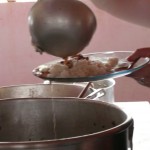A Tale of Two Breakfasts
Breakfast 1.
Itapeva, SP – MST settlement, Insituto da Agro-Ecologia Laudenor de Souza, 8:00 am, 16th February, 2008.
To the background of chirping bird and insects, we start off a sunny Saturday morning eating at wooden picnic-style tables, on handmade wooden benches seating about 10 people at each table. Coffee and tea, both sugary-sweet, are set out on top of two crates, in gallon-size thermoses, from which we 30+ visitors gratefully pour the hot beverages into our red and green plastic mugs. By 8:30, we are eager to eat and get on with our day, though our hosts are reticent to let us begin eating the spread on the table because the cafe-com-leite isn’t ready yet; the milk is taking a while to heat up. We manage to politely convince them that the coffee-with-milk can come later, but that it is too tempting to wait any longer for the food.
The rest of the breakfast, which includes fresh pineapple, cakes topped with pineapple and shredded coconut, as well as the typical french-bread style rolls, accompanied by a mild white cheese, are all homemade. Not only that, the ingredients are all local; the cheese and rolls come from a local cooperative run by the MST, and the cooks have been up since 5:00 am making the cakes. No doubt the pineapple comes from one of the nearby fields, which surround our dining area with an abundance of fruits and vegetables. There is something immensely satisfying about it to me, in its simplicity of presentation and closeness within the field-to-table process of producing the food. The pineapple is wonderfully sweet and fresh.
Among other highlights from the discussion the night before, one of the messages that sticks with me is what a student in the school told me: “We’ve banished the word subsistence from our vocabulary. What we are doing is not subsistence, because subsistence suggests a condition that comes before mere existence. Instead, what we are doing is self-sustaining ourselves. One of the primary parts of our struggle is about food sovereignty. We are aiming to be self-sustaining, growing for our own consumption, and not for exportation. If we can be self-sustaining, we have greater freedom.”
I reflect on this as I eat my all-local, all-organic breakfast, produced fully by the people with whom we have been talking with over the past few hours.
It is a satisfying, bounteous, and nutritious meal. I wish there was an option of stronger, unsweetened coffee, but I leave the breakfast feeling wholesome. Late in the day, someone else in the MST tells me that one of their main tactics for mobilizing people towards their cause is “making contrasts blossom” – that is, making clear the lack of social and economic justice in society by pointing to its inequalities. I understand it as a compelling strategy, in theory at least.
—
Breakfast 2.
Punta Grosso, PR – Barbur Plaza Hotel, 7:30 AM, 17th February, 2008.
It is another clear, sunny day in Brazil, and I’m well-rested after a night in fresh hotel-bed linens, air-conditioning, sleeping in a cushy bed and having a nice warm shower. The breakfast room has some tinkling mu-zak playing as I enter which somehow manages to strike me as strange, although there’s nothing especially irksome about the music in itself. The tables are set, seating four-per table, on padded modernist-style metal chairs, complete with arm rests, decent china, fork and knife, a generous supply of napkins on hand (the soft kind of napkin, none of that wax-paper thin stuff so common in Brazil!). Two uniform-wearing server-types stand ready at the back of the long, highly filled breakfast table, putting on airs of attentiveness (airs, because when water and eggs soon ran out, they were no where to be found to help out).
The spread is bountious, to say the least; three types of sliced bread, french bread rolls with and without sesame seeds, granola, two types of chocolate cereal, oat bran, yogurt, milk, colhada (a buttermilk-style cross between milk and yogurt), ham and turkey slices, and three types of cheese, goiabada, butter, margerine, cream cheese, and an assortment of jams were available. In addition there was a a hot tray containing scrambled eggs, sausages, hot dogs, and cheese-bread (pão de queijo) plus two types of chocolate cake, lime pie, guava-topped cheesecake. In addition to fruit salad, there was also sliced papaya, pineapple, and honeydew melon, as well as whole plums, apples, and grapes. A selection of about four juices were all on the voluptuous table; this impromptu list I’m sure is still omitting many of the items present.
The presentation was beautiful, the food tasty, the options overwhelmingly delicious. I found my black coffee, no extra pre-added sugar. Frankly, I found the meal frustrating, since it was tempting to try to taste everything, but physically impossible to imbibe and ingest all of the options that were available. It was a nutritious, satisfying meal. Also, I successfully resisted the temptation to eat the cake first thing in the morning. Go, me!
I have no idea where the foods came from that were served at the hotel; I have no idea who prepared the dishes; I have no idea what, if any of the items served, were organic or pesticide-covered. I have no concept of how any of the workers at the hotel felt about their working conditions, nor what the true costs of my meal were. I do know that it presented a wealth of variety, and was available only for the elites whom could afford paying for a night’s stay at the hotel. And I do know my reaction – the food was good, the options somehow instinctively pleasing to my aesthetic sensibilities. I also, however, later in the meal had feelings of frustration at the immense variety of foods available for consumption, despite being so thrilled at the many options.
The 5-star hotel’s meal and the MST’s meal were both utopias of food, of a sort. Today’s was a meal made possible only through the realities of a capitalist system of food production, labor, and consumption; yesterday’s, only through the reality of another worldview, wherein social cooperation, proximity to food production, and the non-marketization of food exists, in conjunction with a social vision that prioritizes organic eating as a social responsiblity. The sheer quantity of options and fancy presentation of the meal had also nearly out-shined the fantastic, and totally satisfying breakfast that I’d partaken in only 24 hours earlier, despite my own love of local, organic foods and closeness to their means of production. Honestly, I felt sort of strange about having enjoyed the second breakfast as much as I did – but equally as honestly, I frankly enjoyed it quite a lot.
Tonight the MST school directors’ words about letting contrasts blossom echo in my head, for that is just what the two breakfasts represented; a stark contrast, experienced. It strikes me that much of my feeling about each meal is an aesthetic instinct, my reactions to them socially conditioned towards acknowledging different aspects of each as healthier, more wholesome, or more appealing. How can the experience of both meals guide me towards a sense of which utopia feels more instinctively and rationally just? What has each meal taught me about the decisions I want to make in my own life about food choices and the politics behind eating practices? These are the questions to grapple with not just in reflecting on these two breakfasts, but with every meal.
Comments are closed, but trackbacks and pingbacks are open.